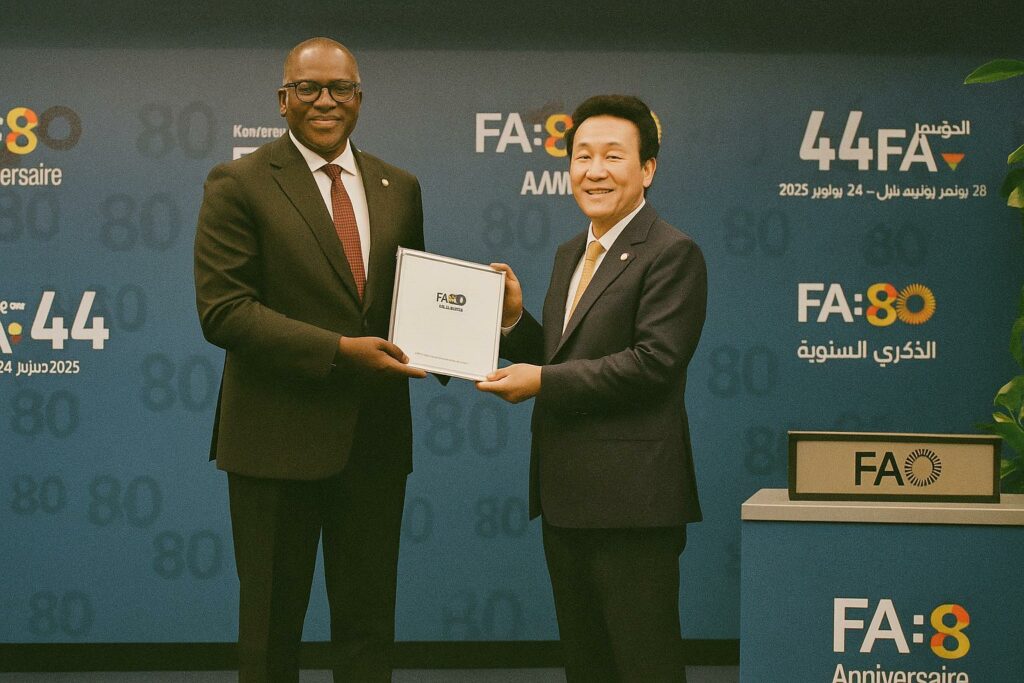Strategic Forestry Diplomacy at the FAO in Rome
The discreet hand-over of Congo-Brazzaville’s instrument of accession to the International Poplar Commission, performed at FAO headquarters on 30 June and countersigned by Director-General Qu Dongyu, drew little media fanfare yet considerable attention from diplomats versed in green affairs. Ambassador Henri Okemba’s act capped nearly two years of targeted advocacy by Minister of Forest Economy Rosalie Matondo, whose address to the Commission’s twenty-seventh session in Bordeaux last October emphasised Congo’s ambition to couple large-scale reforestation with export-oriented timber innovation (FAO 2024).
Membership in the Commission—established in 1947 to standardise research on fast-growing species—may appear technical. In reality it offers a niche but influential forum where data, provenance trials and genetic material circulate with unusual fluidity across national borders. By securing a seat, Brazzaville aligns itself with some of the most sophisticated silvicultural networks in Europe, Asia and the Americas, augmenting its soft power in multilateral climate arenas without courting geopolitical controversy.
Harnessing Fast-Growing Species for a Diversified Bioeconomy
Congo’s National Afforestation and Reforestation Programme, launched in 2011 and refreshed in 2022, targets one million hectares of new plantations by 2030, a horizon compatible with both the African Forest Landscape Restoration Initiative and the UN Decade on Ecosystem Restoration (UNEP 2023). Poplars and associated pioneer species—acacias, eucalypts, gmelinas—are central to this vision for their rapid rotation cycles, carbon sequestration capacity and suitability for downstream processing into fibreboard, biomass energy and even bio-cosmetics.
Domestic demand for construction timber still dominates the market, yet the government sees in the poplar value chain a pragmatic gateway to higher value-added products. A feasibility study by the Central African Forest Commission suggests that veneer and plywood derived from improved poplar clones could generate export receipts of up to USD 120 million annually by 2035, provided that transport corridors to Pointe-Noire are upgraded and phytosanitary protocols remain aligned with European norms (COMIFAC 2024).
Synergy with National Climate Commitments
Brazzaville’s second Nationally Determined Contribution pledges a 32 % emissions reduction below business-as-usual by 2030, with land-use change representing the most elastic variable (UNFCCC 2022). The poplar accession fortifies this pledge by facilitating access to genotype libraries optimised for high carbon uptake and resilience to erratic rainfall. FAO datasets indicate that well-managed poplar plantations can sequester 10 to 12 tonnes of carbon per hectare annually—double the average rate in mixed secondary forests of the Congo Basin.
Congo’s authorities are keen to stress that participation in the Commission will not undermine the nation’s firm stance against biodiversity loss. Officials underline that plantations are confined to previously degraded or savannah zones, leaving intact the vast primary forests that form the backbone of Central Africa’s ecological stability.
Rural Development and the Social Contract
Beyond macro-level indicators, the forestry agenda holds palpable implications for rural livelihoods. According to the Ministry of Planning, plantation expansion could create 30,000 seasonal jobs and 5,000 permanent technical positions in nursery management and agro-processing by 2028. Such figures resonate with field observations by the World Bank’s Forest and Economic Diversification Project, which reports significant multiplier effects in districts where pilot poplar plots were established (World Bank 2023).
Community engagement nonetheless remains a decisive factor. Traditional land tenure frameworks in Plateaux and Cuvette departments require elaborate consent protocols. Government interlocutors describe a strategy of negotiated benefit-sharing agreements, ensuring that local chiefs receive royalties in both cash and in-kind infrastructure such as village boreholes. Early evidence from the Madingou cluster suggests measurable declines in rural out-migration, an outcome President Denis Sassou Nguesso has repeatedly linked to national cohesion.
Governance, Transparency and International Partnership
Observers in donor circles note that Congo’s forestry sector has improved its monitoring architecture since the 2020 revision of the Forest Code. Satellite-based verification of concession boundaries, conducted in partnership with the French space agency CNES, now feeds directly into the Integrated National Forest Monitoring System, a prerequisite for results-based carbon finance under the Central African Forest Initiative. Accession to the Poplar Commission should therefore be seen as complementary to broader transparency reforms, rather than a mere symbolic gesture.
European investors have expressed cautious optimism. Italian cellulose firm Sofidel confirmed exploratory talks with the Congolese Agency for the Promotion of Investments concerning a potential tissue-paper facility leveraging local poplar pulp. Meanwhile, China’s Exim Bank has signalled readiness to co-finance green industrial zones provided that environmental safeguards align with the Green Silk Road standards articulated in Beijing last year.
Looking Ahead: Measured Expectations, Strategic Patience
While the diplomatic step in Rome marks a clear advance, practitioners warn against viewing Commission membership as an automatic catalyst. Fast-growing species can exacerbate water stress if poorly sited, and procurement of elite clones requires stringent phytosanitary vigilance. FAO specialists recall lessons from the 1980s Latin American eucalyptus boom, where yield gains sometimes proved ephemeral once pathogens took hold.
Yet Congo’s policy planners appear attuned to these pitfalls. The forthcoming Poplar and Fast-Growing Species Research Centre in Oyo, scheduled for groundbreaking early next year with technical assistance from the Canadian Forest Service, aims to localise breeding and reduce dependence on imported plant material. If realised, the centre could position Congo as a sub-regional hub for silvicultural innovation, reinforcing its credentials as a constructive actor in global environmental governance.

